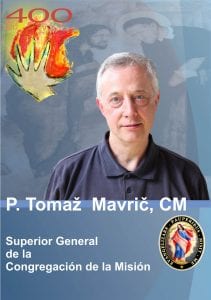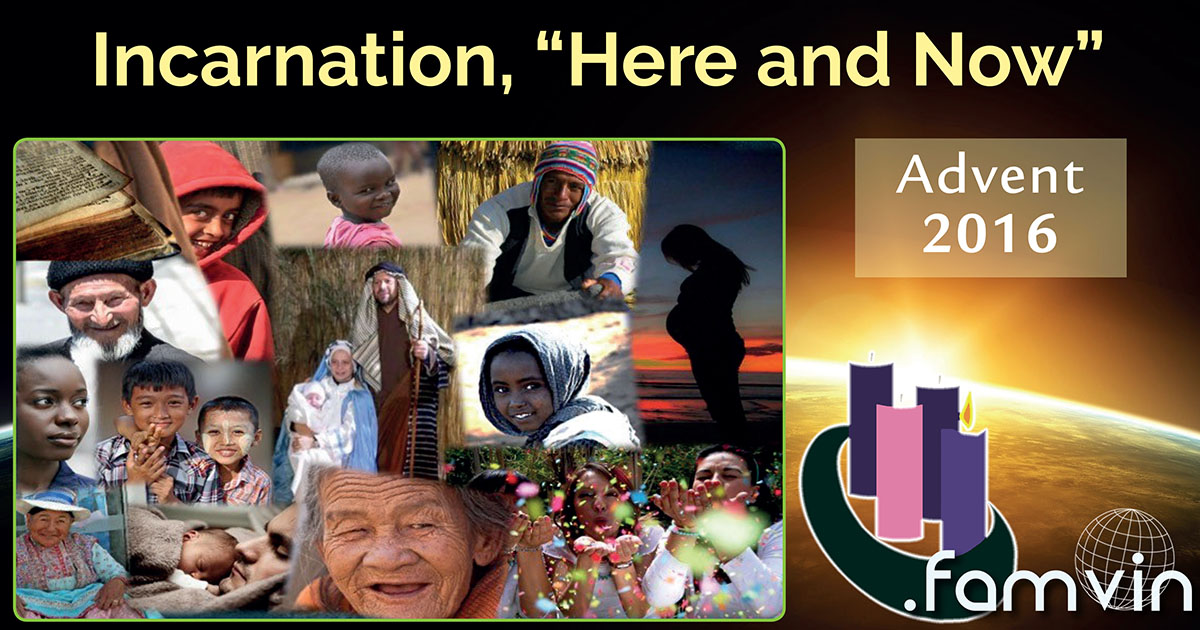“The Incarnation, Here and Now”: this is the theme proposed by Fr. Tomaž Mavrič, CM, for the time of Advent, in a letter addressed to the entire Vincentian Family, which we have reproduced below.
After the text, you will find links to download his letter in several languages.
Rome, November 18, 2016
To all the members of the Vincentian Family
Dear members of the Vincentian Family,
May the grace and peace of Jesus be always with us!
 Every period of the liturgical year is a gift from God to us. The Season of Advent is God’s gift to us!
Every period of the liturgical year is a gift from God to us. The Season of Advent is God’s gift to us!
One of the central mysteries of Saint Vincent de Paul’s spirituality is the Incarnation. The whole period of Advent, as well as Christmas and the whole Christmas Season, places the Mystery of the Incarnation at the center of its message.
Incarnation means: God becoming man; God becoming a human being like us; God lowering himself to our level; God identifying himself with each single person individually, from the beginning of humanity until the end of time.
Jesus is incarnated every single day, over and over again, in all the corners of the world. In every conception, at the beginning of every human life, Jesus is incarnated again. Therefore, Jesus’s real presence in the human person, his Incarnation, needs to be felt in every period of human history, in every area of human development: faith, culture, science, education, politics, etc.
The Jesus, who was conceived, born, suffered, died, and raised from the dead, lives “HERE AND NOW,” thirsts and longs to be rediscovered by us, so as to renew and deepen our closeness with Him, our friendship, the love between Him and me.
Saint Vincent de Paul left us, among his other words, the following thoughts on the Incarnation:
According to the Bull which established our Congregation, we are bound to honor in a special way the Most Holy Trinity and the Incarnation, mysteries beyond words. We should therefore try to carry this out most faithfully and, if possible, in every way, but especially in these three ways: (1) frequently honoring these mysteries by a prayer of faith and adoration, coming from our inmost heart; (2) dedicating certain prayers and good works each day to their honor and, above all, celebrating their feast days with special dignity, and the greatest possible personal devotion; (3) trying constantly, by our teaching and example, to get other people to know these mysteries and to honor and worship them (CCD, XIIIA, 454-455).
There can be no better way of paying the best honor possible to these mysteries than proper devotion to, and use of, the Blessed Eucharist, sacrament and sacrifice. It includes, as it were, all the other mysteries of faith and, by itself, leads those who receive Communion respectfully or celebrate Mass properly, to holiness and ultimately to everlasting glory. In this way God, Unity and Trinity, and the Incarnate Word, are paid the greatest honor. For these reasons, nothing should be more important to us than showing due honor to this sacrament and sacrifice. We are also to make a great effort to get everyone else to pay it similar honor and reverence. We should try, to the best of our ability, to achieve this by preventing, as far as we can, any lack of reverence in word or act, and by carefully teaching others what to believe about so great a mystery, and how they should honor it (CCD, XIIIA, 455).
Father Erminio Antonello, C.M., shares with us the following thoughts:
While humans attempted in every way to exalt themselves, trying to be “gods,” God was not afraid to reverse direction and become a man: not a famous man, but a child, fragile and threatened from the beginning. Saint Vincent would say: “Don’t we also see that the Eternal Father, having sent His Son on earth to be the light of the world, nevertheless, had Him appear only as a little boy, like one of those poor little ones you see coming to this door?” (CCD, XI, 339). What is it in humans that made God want to bend down to them and exchange his divinity with the humanity of the creature? There is the love of a Father. There is his desire to hold humanity in a close embrace. He – so to speak – misses us. He wants us to be born again by his love. It may seem strange perhaps that God misses us, his creatures; yet the whole history of salvation tells of his search for us. This is the mystical insight that will lead Saint Vincent to recognize the continual incarnation of God in the poor. He felt within himself God’s tenderness and, having lived and experienced it, can pour it out on the smallest of the kingdom.
To live the mystery of the Incarnation today means, then, to realize the reality that there is this desire of God within us (that is, his love that seeks us, whose name is “Holy Spirit”) and trust him: this rescues us from the insignificance of life. Every person feels this elementary need, which is so often disappointed: “Just to be looked on favorably!” This desire is a source of psychological vitality. When it fails, encountering glances that belittle and say, you are worth nothing to me, you are a meaningless zero, then our faces darken and life fades. Now what is God’s gaze upon us witnessed by Jesus, the Son who became incarnate? He looks upon people with benevolence and wants to make his home in each of them. In this attitude of the Incarnate Word’s drawing close to humanity, what is in play is the life force of the gracious and sanctifying encounter with God.
- How do I rediscover the Incarnate Jesus today, Jesus who is alive “HERE AND NOW” in my own life?
- What can I do so that the different feasts and periods during the liturgical year, which remind us of the Incarnation, of God becoming man — the Annunciation, Advent, Christmas – can be celebrated in a renewed, more personal way in our communities, within the whole of the Vincentian Family, with others with whom we collaborate and serve, that will help us to realize the “HERE AND NOW” of the Incarnation, of the living presence of Jesus in our midst?
- What new initiatives can we suggest and put into action so that Jesus’s presence “HERE AND NOW” will be felt more in our communities, the areas of our service, in the villages, cities, countries, and the whole world?
We enter the season of Advent Season, knowing that we are not alone. Jesus, Our Lady of the Miraculous Medal, our Founder, all the Blessed and Saints of the Vincentian Family accompany us on the journey.
My thoughts and prayers go out to all the many branches of the Vincentian Family and each single member. May the Advent journey bring us deep comfort, joy, encouragement, renewed commitment, peace, and inner fire! May Christmas and the whole Christmas Season unite our hearts and minds!
Together in prayer in front of the manger and trusting in Providence, we look with great confidence to the year 2017, the 400th anniversary of our common Charism. Open to the “signs of the times,” we keep walking together – because “Love is inventive to infinity” (CCD, XI, 131).
Have a wonderful Christmas and a very happy New Year 2017!
Your brother in Saint Vincent,
Tomaž Mavrič, CM Superior General
Access to the document in PDF format, in several languages:
| BOX.COM | SCRIBD.COM | |
| All languages PDF format |
http://famv.in/L-Advent2016 | http://famv.in/S-Advent2016 |
| English | http://famv.in/L-AL16-EN | http://famv.in/S-AL16-EN |
| Español | http://famv.in/L-AL16-ES | http://famv.in/S-AL16-ES |
| Française | http://famv.in/L-AL16-FR | http://famv.in/S-AL16-FR |
| Polski | http://famv.in/L-AL16-PL | http://famv.in/S-AL16-PL |
| Português | http://famv.in/L-AL16-PT | http://famv.in/S-AL16-PT |
| Italiano | http://famv.in/L-AL16-IT | http://famv.in/S-AL16-IT |
| Deutsch | http://famv.in/L-AL16-DE | http://famv.in/S-AL16-DE |
| Slovakia | http://famv.in/L-AL16-SK | http://famv.in/S-AL16-SK |
| eBook | http://famv.in/L-AL16-ebook | http://famv.in/S-AL16-ebook |






0 Comments